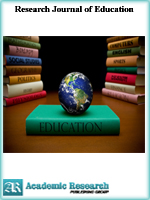Research Journal of Education
Online ISSN: 2413-0540
Print ISSN: 2413-8886
Print ISSN: 2413-8886
Quarterly Published (4 Issues Per Year)

Archives
Volume 3 Number 12 December 2017
Open and Distance Learning for Blind: Empirical Review of the Challenges Faced by Learners Who Have Visually Impaired
Authors: William Ayub Mng?ong?ose ; Mkanibwa Ngoboka ; Romed Kavenuke ; Alberto Gabriel Ndekwa
Pages: 186-189
Abstract
It is well evidenced that students with visual impairments have basic learning experiences because they do not able to observe other objects and visuals and their educational needs of the visually impaired students may vary from person to person. This study focused on investigating the challenges facing visually impaired students who are in open and distance learning model using prior empirical literature review. Findings using contents analysis have indicated that university social view, inadequate resources and unfriendly university environment are the main challenges affecting their academic progress. The study have recommended that the university should ensure that learning environments for people with physical disabilities to have specific considerations in design and implementation to ensure their appropriateness and accessibility.
Research on Strategies of Exam-Oriented Education Turning to Quality Education-Based on the Perspective of New Institutional Economics
Authors: Sitong He ; Wenzhong Zhu
Pages: 180-185
Abstract
The aim of national macroscopic education is cultivating students’ personal quality and learning ability, but the choice of selecting talents by exam as an alternative standard has aroused the upsurge of "exam-oriented education" from primary school to university. From the perspective of new institutional economics, the traditional teaching concept of "exam-oriented education" is deeply rooted in people’ mind because of the lack of effective property rights incentive system, such as transaction cost, path dependence and signal theory. As a derivative substitute, the exam can reduce the transaction cost, yet on the other hand, from the view of signal theory, it regards "score" as a signal to judge "quality and ability", which leads to asymmetric information and will have a great influence on the training of object of students and receiving objects of society as well as social relations. It’s difficult for talents under exam-oriented education to adapt to the market economy in the disposition ability. This developing method causes the waste of social resources, which is contrary to the training goal. This paper studies and discusses the economic reasons of exam-oriented education from the perspective of new institutional economics, analyzes the necessity of quality-oriented education and puts forward specific methods and strategies.
Accounting Student,s Motives, Expectations and Preparedness for Higher Education: A Study among University and College Students in Multan
Authors: Muhammad Shahid Iqbal ; Muhammad Atif Ishaq ; Ume Habibah ; Shehzadi Sidra ; Muhammad Ismail
Pages: 173-179
Abstract
The students getting entered in colleges and universities for their higher education have some sort of motives and expectations towards their degree programs. They also have some degree of preparedness towards their educational institute and mainly towards their major subjects. The purpose of this paper is to investigate the differences in motivation, expectations and preparedness towards the higher education among first-year students on gender basis having accounting as a major subject. Data have been collected from the educational institutions of Multan. It is found that students either male or female, have same level of motives, expectations and preparedness towards higher education. The results of this study revealed no significance differences on the basis of gender among the first year students of college and university.



